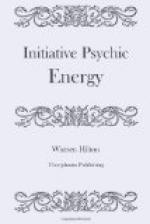[Sidenote: Conquering Indecision]
So it will be with you. With doubt and uncertainty the pressure may be high in the gauge, but the engine does not move. Make up your mind, and you release energies previously wasted in conflicts between opposing thought complexes struggling for supremacy.
[Sidenote: Why “Christian Science” Works]
A fine illustration of this is shown in the religious experience known as conversion. To the convert, conversion means the profound acceptance of a mighty spiritual truth. It means positive knowledge taking the place of doubt or indifference. Conflicting ideas are no longer present in his consciousness. Pent-up energies are released. He wants to do things. His soul is fired with overmastering impulses to action. He wants to go forth and preach the gospel of his faith. He is lifted to a high plane of exhilaration. He experiences the “peace that passeth understanding.”
“Christian Science,” “Truth,” “The New Thought,” and similar movements all achieve their really marvelous results in much the same way. All proclaim doctrines of exuberant optimism, having a tendency to banish fear-thoughts and self-consciousness and self-depreciation, and to set up in their stead ideas of courage and of achievement and of individual power. If these teachings are successful—that is to say, if they inherently possess the right appeal for the particular individual—they have the happy effect of begetting a stoical indifference to petty physical disorders and social vexations and bringing about a concentration upon the main business of life of the mental energies thus previously wasted.
[Sidenote: How to Release Pent-Up Power]
Decide the matter that is troubling you. Make an end of hesitation and uncertainty and fear. Your very act of decision will release large stores of pent-up mental power and add immeasurably to your effectiveness.
So long as you are in doubt and perplexity conflicting ideas and impulses balance each other. You are not then a man of action; you are a wavering coward. You are afflicted with paralysis of will and mental stagnation.
Decide the matter—that is to say, let one mental picture assume a greater vividness than the other until it possesses your soul—and forthwith the banked fires of your mental energy will burst into flame.
Another thing: Stop wasting your time.
How much time do you spend in rest and relaxation? How much should you spend? Can you answer these questions accurately?
[Sidenote: Proper Ratio Between Work and Rest]
Thomas A. Edison has contended for years that four hours’ sleep a day was sufficient for any man. He has conducted experiments with a large number of men, giving careful attention to matters of diet and exercise, and the results have seemed in a measure to support his theory.




